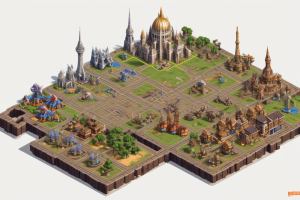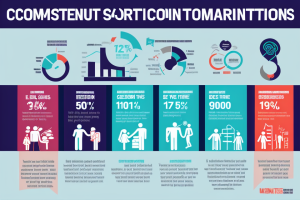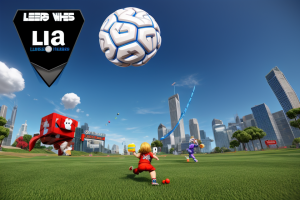
Are you a fan of strategy games? Do you often find yourself glued to your screen, planning your next move in your favorite game? Well, you may be surprised to know that playing strategy games can actually boost your IQ! But, how exactly does this happen? In this article, we will explore the fascinating relationship between gaming and intelligence, and delve into the science behind how strategy games can increase cognitive abilities. So, let’s get ready to discover the surprising ways in which gaming can enhance your brain power!
The Link Between Strategy Games and Intelligence
The Role of Cognitive Abilities in Strategy Games
Problem-solving
One of the key cognitive abilities required in strategy games is problem-solving. Players must be able to analyze situations, identify patterns, and develop effective strategies to overcome challenges. This process involves using a combination of critical thinking, creativity, and logic to make informed decisions. Strategy games often present players with complex scenarios that require them to think outside the box and come up with innovative solutions. As players become more adept at problem-solving, they may find that their ability to think critically and creatively improves in other areas of their life as well.
Decision-making
Another important cognitive ability that is honed through strategy games is decision-making. Players must constantly make choices about how to allocate resources, when to attack, and how to defend. These decisions are often made under time pressure and with limited information, requiring players to weigh the risks and benefits of each option. Strategy games can help players develop the ability to make quick, informed decisions, even in high-pressure situations.
Planning
Strategy games also require players to engage in extensive planning. Whether it’s building a base, assembling a team, or developing a battle strategy, players must be able to anticipate potential challenges and develop contingency plans. This process involves using working memory to keep track of multiple pieces of information, as well as the ability to focus on long-term goals while simultaneously responding to changing circumstances. Strategy games can help players develop their planning skills, which can be beneficial in a wide range of real-world situations.
Adaptability
Finally, strategy games require players to be adaptable and flexible. As players progress through the game, they may encounter new challenges and obstacles that require them to adjust their strategies on the fly. This involves being able to recognize when a plan is not working and being willing to change course. Strategy games can help players develop their ability to adapt to new situations, which can be valuable in both personal and professional contexts.
Overall, strategy games require players to engage in a wide range of cognitive abilities, including problem-solving, decision-making, planning, and adaptability. As players become more skilled at these activities, they may find that their overall cognitive abilities improve as well. While more research is needed to fully understand the relationship between gaming and intelligence, there is evidence to suggest that strategy games can be a valuable tool for improving cognitive function.
The Effects of Strategy Games on the Brain
Research has shown that playing strategy games can have a positive impact on the brain and cognitive abilities. These games require players to make complex decisions, think critically, and adapt to changing situations, all of which contribute to the development of cognitive skills. Here are some of the ways in which strategy games can affect the brain:
- Neuroplasticity: Neuroplasticity refers to the brain’s ability to change and adapt in response to new experiences. Strategy games can promote neuroplasticity by challenging players to learn new skills and strategies, which can lead to the formation of new neural pathways in the brain. This process can improve memory, attention, and problem-solving abilities over time.
- Brain network synchronization: Strategy games often require players to coordinate multiple actions and movements, which can improve the synchronization of different brain networks. This synchronization can enhance communication between different regions of the brain, leading to improved cognitive control and decision-making abilities.
- Executive function improvement: Executive functions refer to a set of cognitive processes that help individuals plan, organize, and execute tasks. Strategy games can improve executive functions by requiring players to prioritize tasks, manage resources, and adapt to changing circumstances. This can lead to better time management, goal-setting, and problem-solving abilities in real-life situations.
Overall, the effects of strategy games on the brain are complex and multifaceted. While more research is needed to fully understand the relationship between gaming and intelligence, the available evidence suggests that strategy games can provide cognitive benefits and potentially boost IQ in certain areas.
Popular Strategy Games and Their Impact on Intelligence
Real-Time Strategy Games
- Starcraft
- Overview of Starcraft and its popularity
- Competitive scene and professional players
- Skills required for playing Starcraft, such as decision-making, micro-management, and macro-management
- Command & Conquer
- Overview of Command & Conquer and its popularity
- Different types of game modes, such as single-player and multiplayer
- Skills required for playing Command & Conquer, such as resource management, strategy planning, and execution
- Age of Empires
- Overview of Age of Empires and its popularity
- Different types of civilizations and game modes
- Skills required for playing Age of Empires, such as building and managing armies, economic management, and strategic thinking
Overall, real-time strategy games like Starcraft, Command & Conquer, and Age of Empires can provide a stimulating and challenging environment for players to improve their cognitive skills. These games require players to make quick decisions, manage resources, plan strategies, and think critically, all of which can help to enhance their problem-solving abilities and boost their IQ. However, it is important to note that playing these games alone may not be enough to significantly improve one’s intelligence, and other factors such as education, genetics, and life experiences also play a role in determining one’s cognitive abilities.
Turn-Based Strategy Games
Turn-based strategy games are a popular genre of games that require players to think critically and strategically in order to achieve victory. These games involve players making decisions that affect the outcome of the game, and they often require players to consider multiple factors such as resources, units, and terrain.
Chess
Chess is one of the most well-known turn-based strategy games, and it has been played for centuries. It is a game that requires players to think deeply about their moves, as each move can have a significant impact on the outcome of the game. Chess has been shown to improve cognitive skills such as memory, spatial reasoning, and problem-solving.
Go
Go is another popular turn-based strategy game that originated in ancient China. It is a game that involves players placing black or white stones on a grid in order to capture territory and surround their opponent’s stones. Go requires players to think strategically and plan ahead, as each move can have a significant impact on the board state. Studies have shown that playing Go can improve cognitive skills such as spatial reasoning and pattern recognition.
Civilization
Civilization is a popular turn-based strategy game that allows players to build and manage their own civilization from the ancient era to the modern age. The game requires players to make strategic decisions such as where to build cities, what technologies to research, and how to manage resources. Playing Civilization has been shown to improve cognitive skills such as strategic thinking, problem-solving, and decision-making.
Overall, turn-based strategy games such as Chess, Go, and Civilization have been shown to improve cognitive skills such as memory, spatial reasoning, problem-solving, and strategic thinking. These games require players to think critically and strategically, and they can provide a fun and engaging way to improve intelligence.
Puzzle Games
Puzzle games are a subgenre of strategy games that require players to solve problems by piecing together clues, uncovering hidden patterns, and using logical reasoning. These games have become increasingly popular due to their simplicity, accessibility, and potential cognitive benefits. Some of the most well-known puzzle games include Sudoku, Tetris, and Candy Crush.
Sudoku
Sudoku is a number-placement puzzle that requires players to fill a grid with numbers so that each row, column, and region (subgrid) contains every number from 1 to 9. The game’s objective is to use logic and deduction to determine the correct placement of the numbers. Studies have shown that playing Sudoku can improve cognitive skills such as working memory, spatial reasoning, and problem-solving abilities.
Tetris
Tetris is a classic puzzle game in which players manipulate different-shaped tetrominoes (shapes composed of four squares) to fill a rectangular playing field without causing it to overflow. The objective is to create lines of consecutive blocks without gaps to eliminate them from the board. Research has shown that playing Tetris can improve visual-spatial reasoning, reaction time, and other cognitive skills.
Candy Crush
Candy Crush is a popular match-3 puzzle game in which players swap adjacent candies to create sets of three or more of the same color, which then disappear, clearing the way for new candies to fall from the top. The objective is to progress through levels by reaching specific goals, such as clearing a certain number of jelly beans or saving trapped characters. Although some critics argue that Candy Crush may not be as intellectually stimulating as other puzzle games, studies have shown that playing the game can still provide cognitive benefits, such as improved attention and processing speed.
Overall, puzzle games like Sudoku, Tetris, and Candy Crush can provide various cognitive benefits, such as improving problem-solving skills, reaction time, and spatial reasoning. These games offer an enjoyable way to exercise the mind and potentially boost IQ.
Multiplayer Online Battle Arena Games
Multiplayer Online Battle Arena (MOBA) games have become increasingly popular in recent years, with games like Dota 2, League of Legends, and Heroes of the Storm dominating the gaming industry. These games require players to strategize and collaborate with their teammates to achieve a common goal, which is to destroy the enemy’s base while defending their own.
The complexity of MOBA games lies in their combination of strategy, teamwork, and fast-paced action. Players must make split-second decisions, communicate with their team, and adapt to changing situations in order to emerge victorious. This requires a high level of cognitive ability, including decision-making, spatial awareness, and pattern recognition.
Research has shown that playing MOBA games can have a positive impact on cognitive abilities, including working memory, attention, and inhibitory control. One study found that players of MOBA games showed improved performance on tests of spatial reasoning and multitasking compared to non-players.
Moreover, playing MOBA games has been shown to enhance problem-solving skills and critical thinking. These games require players to constantly evaluate the battlefield, assess the strengths and weaknesses of their team and the enemy, and devise strategies to achieve victory. This process of strategic thinking has been linked to improved cognitive flexibility and creativity.
Overall, while the relationship between gaming and intelligence is complex and multifaceted, there is evidence to suggest that playing MOBA games can have a positive impact on cognitive abilities and problem-solving skills. However, it is important to note that the benefits of gaming are not exclusive to these types of games, and other genres may offer unique advantages as well.
The Science Behind Strategy Games and Intelligence
Research Studies on Strategy Games and Cognitive Ability
Several research studies have investigated the relationship between strategy games and cognitive ability, with some revealing a positive correlation between the two. This suggests that playing strategy games may have a positive impact on a player’s IQ.
One study conducted by the University of Oregon found that players of strategy games showed an improvement in their cognitive skills, including their ability to reason, plan, and solve problems. These improvements were also found to transfer to real-life situations, suggesting that playing strategy games may have practical benefits beyond the gaming world.
Another study conducted by the University of Wisconsin-Madison found that playing strategy games was associated with an increase in grey matter volume in the brain regions associated with executive function, including decision-making and problem-solving. This suggests that playing strategy games may lead to physical changes in the brain that can improve cognitive ability.
Furthermore, a study published in the journal “Cognition” found that playing strategy games was associated with an improvement in spatial reasoning ability, which is an important aspect of intelligence. This suggests that playing strategy games may have a positive impact on multiple cognitive abilities, not just those related to strategy and problem-solving.
Overall, these studies suggest that playing strategy games may have a positive impact on cognitive ability and IQ, and that these benefits may extend beyond the gaming world into real-life situations. However, it is important to note that the relationship between gaming and intelligence is complex and may depend on various factors, such as the type of game played and the individual’s personal characteristics.
Brain-Based Evidence for Strategy Games and Intelligence
Brain Activity Changes During Gaming
Research has shown that when individuals engage in strategy games, there is a noticeable change in brain activity. The prefrontal cortex, which is responsible for decision-making and problem-solving, is highly active during gaming sessions. This part of the brain is also associated with intelligence and cognitive abilities. As players navigate through levels and overcome challenges, the prefrontal cortex adapts and strengthens, potentially leading to improved cognitive function over time.
Long-term Impact on Brain Structure and Function
Studies have found that playing strategy games can have a long-term impact on brain structure and function. Researchers have observed changes in the gray matter density of the prefrontal cortex, which is associated with improved cognitive control and executive function. Additionally, other brain regions, such as the hippocampus, which is involved in memory and spatial navigation, have also shown signs of structural changes in frequent gamers.
Furthermore, some research suggests that playing strategy games may enhance the development of neural networks in the brain, particularly in areas related to decision-making and problem-solving. This may contribute to improved cognitive performance and overall intelligence.
It is important to note that while these findings are promising, more research is needed to fully understand the relationship between gaming and intelligence. Factors such as the type of game, duration of play, and individual differences in cognitive abilities should be taken into consideration when examining the potential benefits of gaming on intelligence.
Criticisms and Future Directions for Research
Methodological Limitations
While there is a growing body of research suggesting that strategy games can enhance cognitive abilities, it is important to acknowledge the methodological limitations of current studies. For instance, many studies have relied on self-reported measures of gameplay and cognitive performance, which may be subject to biases and inaccuracies. Additionally, many studies have focused on short-term outcomes, providing limited insight into the long-term effects of gaming on cognitive development.
Need for More Longitudinal Studies
To address these limitations, future research should focus on conducting longitudinal studies that track cognitive development over an extended period of time. By doing so, researchers can gain a more nuanced understanding of the impact of gaming on cognitive development and rule out alternative explanations for observed effects. Additionally, longitudinal studies can help to identify the specific mechanisms through which gaming impacts cognitive development, such as the development of executive function or spatial reasoning skills.
The Impact of Different Genres and Play Styles on Cognitive Development
Another important direction for future research is to explore the impact of different genres and play styles on cognitive development. While many studies have focused on strategy games, other genres such as puzzle games, sports games, and simulation games may also offer unique cognitive benefits. Additionally, different play styles, such as competitive versus cooperative play, may impact cognitive development in different ways. Understanding the unique benefits and drawbacks of different genres and play styles can help to inform the design of future games and maximize their potential for cognitive enhancement.
Strategy Games and Intelligence: What Do the Experts Say?
Opinions from Gaming Experts
The Potential of Gaming for Cognitive Development
Numerous gaming experts suggest that strategy games can indeed enhance cognitive abilities. One such expert, Dr. Daria Dzyabura, a cognitive psychologist at the University of Glasgow, believes that strategy games have the potential to improve players’ problem-solving skills and spatial reasoning abilities. In her research, Dr. Dzyabura has found that strategy games, such as the popular game “StarCraft,” can lead to improved performance in tasks that require the manipulation of visual and spatial information.
Additionally, Dr. Dzyabura’s research indicates that strategy games may have the potential to improve players’ working memory, which is the ability to temporarily store and manipulate information. This improvement could lead to better performance in a variety of cognitive tasks, both in and out of the gaming world.
Balancing Gaming with Other Educational Activities
While many gaming experts agree that strategy games can offer cognitive benefits, they also stress the importance of balancing gaming with other educational activities. Dr. Katherine Moline, a psychologist at the University of California, says that “playing strategy games should be seen as just one aspect of a well-rounded cognitive training program.”
Dr. Moline recommends that individuals engage in a variety of cognitive activities, including strategy games, to promote overall cognitive development. She suggests that incorporating gaming into one’s daily routine can be a fun and engaging way to challenge the brain and maintain cognitive fitness.
Overall, gaming experts agree that strategy games have the potential to boost cognitive abilities, but they also emphasize the importance of maintaining a balanced approach to cognitive training.
Views from Neuroscientists
The role of gaming in brain plasticity
- Neuroplasticity refers to the brain’s ability to change and adapt in response to new experiences.
- Research has shown that playing strategy games can lead to changes in the brain that improve cognitive abilities.
- A study conducted by the University of Wisconsin-Madison found that playing a single session of a strategy video game improved cognitive control, which is the ability to direct your attention and thoughts.
- Another study published in the journal “Nature” found that playing a multiplayer online game improved communication skills and problem-solving abilities in adolescents.
The importance of game design for cognitive development
- The design of a game can greatly impact its ability to improve cognitive abilities.
- Games that are designed to be challenging and require strategic thinking have been shown to be the most effective at improving cognitive abilities.
- Games that are too easy or too difficult can actually have a negative impact on cognitive development.
- Neuroscientists recommend games that are challenging but not frustratingly difficult, and that provide feedback to the player to help them improve their skills.
In conclusion, neuroscientists believe that strategy games can play a role in boosting cognitive abilities, but the design of the game is crucial in achieving this goal. Games that are challenging and require strategic thinking are the most effective at improving cognitive abilities, while games that are too easy or too difficult can have a negative impact.
Perspectives from Educators
In recent years, educators have started to recognize the potential benefits of incorporating strategy games into the classroom setting. Here are some perspectives from educators on how gaming can enhance problem-solving and critical thinking skills:
- Integrating strategy games into the classroom
- Educators have started to use various strategy games as a teaching tool to engage students and help them learn complex concepts in a more interactive and fun way. For example, a game like Civilization can be used to teach students about history, politics, and economics.
- Strategy games like Starcraft are also being used in some schools to teach decision-making and strategic thinking skills.
- Using gaming to enhance problem-solving and critical thinking skills
- Strategy games often require players to think critically and solve complex problems, which can help improve these skills in real life.
- Games like The Witness challenge players to solve puzzles by thinking logically and using their observation skills, which can help develop these skills in players.
- Educators can also use games like Minecraft to teach students about architecture, engineering, and problem-solving, as players must build structures and solve challenges to progress through the game.
Overall, educators are starting to see the potential benefits of incorporating strategy games into the classroom, as they can provide a fun and engaging way to teach important skills and concepts.
FAQs
1. What is a strategy game?
A strategy game is a type of game that requires players to make decisions and develop plans in order to achieve a goal or objective. These games often involve elements of problem-solving, critical thinking, and planning.
2. Can playing strategy games improve intelligence?
There is some evidence to suggest that playing strategy games can improve certain aspects of intelligence, such as spatial reasoning and decision-making skills. However, more research is needed to fully understand the relationship between gaming and intelligence.
3. What types of strategy games are best for improving intelligence?
There is no one-size-fits-all answer to this question, as different games may be better suited for improving different types of intelligence. However, games that require players to make complex decisions and strategies, such as chess and Risk, have been shown to have cognitive benefits.
4. How often should I play strategy games to see a benefit?
The frequency at which you play strategy games may affect the potential benefits. It is likely that playing strategy games regularly over a long period of time would be more beneficial than playing occasionally.
5. Are there any negative effects of playing strategy games on intelligence?
There is currently no evidence to suggest that playing strategy games has any negative effects on intelligence. However, excessive or addictive gaming can have negative effects on mental health and well-being.
6. Can strategy games improve intelligence in children?
There is some evidence to suggest that playing strategy games can improve intelligence in children. However, more research is needed to fully understand the relationship between gaming and intelligence in this age group.
7. What other factors can affect the relationship between gaming and intelligence?
There are many factors that can affect the relationship between gaming and intelligence, including the type of game being played, the frequency and duration of gameplay, and individual differences in cognitive abilities and learning styles.






